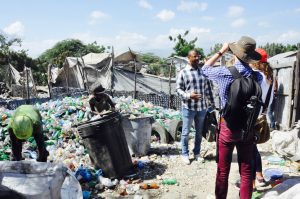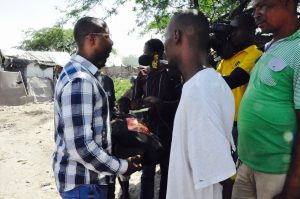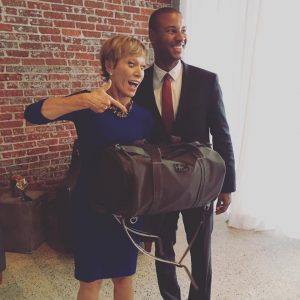The Bonfires of Social Enterprise with Romy of Gingras Global | Social Enterprise | Entrepreneurship in Detroit
«
»
S3: Hamilton Perkins Bags and Recycled Plastic #82
Manage episode 309036519 series 3025717
Hamilton Perkins
Hamilton and his team are working with Thread International to make bags and other accessories from some of the recycled plastics in Haiti. He has very interesting story. Be sure to stay tuned for a great Detroit artist group called The Infatuations. You will feel like you are transported back in time with their great song.
For the full transcript – click below
Introduction:
Welcome to another episode of the Bonfires of Social Enterprise. This is Romy. I am your host for this show. We had a little gap in our postings there, sorry about that! Sometimes I am doing too many things and it catches up with me. Well, we have a great guest today from Virginia. Shout out to our listeners in Virginia! Hamilton Perkins is the founder of a business called Hamilton Perkins. Hamilton and his team are working with Thread International to make bags and other accessories from some of the recycled plastics in Haiti. He has very interesting story. Be sure to stay tuned for a great Detroit artist group called The Infatuations. You will feel like you are transported back in time with their great song.
First, let’s check out our Fun Fuel
This is Natalie Hazen, and I am bringing you the Fun Fuel for this episode.
The popularity of recycling has had its share of bumps and bruises over the years, but who or what started this idea of recycling? Many give credit of first recycling to none other than Mr. T-Rex and his dinosaur buddies Mr. Stegosaurus and Ms. Triceratops for decomposing and then producing various oils and gasses. Way to go dinos!
But really, in 500 BC, it was Athens, Greece who organized the first municipal dump program in the western world. In an article written by Matt Bradbury in May 2014 for the Resource Center Powered by Busch Systems, he states that Athen’s local laws dictated that waste had to be disposed of at least one mile from the city walls. Quite a hike.
But for the United States, it was the year 1690 that the recycled paper manufacturing process was introduced. The Rittenhouse Mill near Philadelphia, Pennsylvania made paper from fiber derived from recycled cotton and linen rags.
Well, that wraps up our fun fuel and now onto the episode.
Thanks Natalie! What a fun connection to the history of dinosaurs. Love it!
Okay, let’s jump in to my conversation with Hamilton
Main Interview:
Romy: Hamilton, welcome to the Bonfires of Social Enterprise Podcast Show.
Hamilton: Thank you so much for having me, I'm really delighted to be here.
Romy: Now we're on the phone together, I'm in Detroit, and you're calling from ... Is it Norfolk Virginia? That's where you're in?
Romy: All right, well let's jump right into it. Let's talk about the Hamilton Perkins Collection. We know already that you're the founder, and you're the sort of visionary, so it's named after you. Can you tell us about the business?
Hamilton:
Yeah, so we make bags out of recycled plastic bottles and recycled billboard vinyl. Every bag is different; every bag is unique. We source the plastic out of Haiti, and we also cut and sew the bags in Haiti as well. We started with a Kickstarter Campaign, a little bit over nine months ago. Had a $10,000 goal, we hit the goal in about a week. We had a couple hundred orders that needed to be sent out and had about a six month lead time. Took some time, we hit the business plan competition circuit; we were able to take home the grand prize of $25,000 at the Virginia Velocity Tour. From there we hit a trunk show at Bloomingdale's, we hosted a one-day sales event in New York at the 59th street location. And came back to Virginia, and shipped out hundreds of orders to our first set of customers, and turned our own website on after that at HamiltonPerkins.com.
Romy: Oh yeah, and thanks for ... It's always great to give a shout out for those who kind of helped you with the steps along the way. Was it the Virginia Velocity Tour and Kickstarter is two I just wrote down. It's great to let them know because those programs are essential to a lot of the startup entrepreneurs, aren't they?
Hamilton:
Yeah, totally. I think for us, our situation was we wanted to make a better bag. We figured there wasn't as much selection I guess if you think about department stores, or online stores when it comes to a bag that kind of had impact, or a bag that had a purpose. By kind of collaborating, and working with different organizations, other websites that had larger audiences, we were able to figure out, "Okay, we can kind of get this in front of people that are already kind of looking for what we're making." From there it would make more sense to eventually see how can we expand our line, and get people that can help us with that, that have technical experience and basically are more subject matter experts.
Virginia Velocity Tour was great because it brought a lot of really seasoned business people together, entrepreneurs together, mentors together, and really concentrated the efforts so that we could basically tell our story, get feedback, kind of run through some rigorous kind of steps to actually pitch our businesses. It was really just a great turnout, we made great relationships from there, and we're still moving ahead from now.
Romy:
Wow, that's powerful. Well thanks to them. And you just hit on so many of the things that so many of the entrepreneurs in the social space have to kind of walk through all of those doorways, but those relationships, if done well, really conserve you during the lifecycle of your business. It's great you gave them a shout out. Let's go back to you. I ... In the beginning, you said you are making the bags, and sourcing the materials from Haiti. I have a feeling that has something to do with the original, how this was all originally inspired. Can you take us there? What's going on in through your connection with Haiti?
Hamilton:
Yeah, totally. In the beginning, the idea was how we could make a better bag? The majority of the bag, there just wasn't like as much, I guess transparency around how they were made, and who worked on them, and kind of what was happening, where the materials were coming from. We thought it would be great to tell that story, actually empower people that are traveling, while still supporting dignified income opportunities with the same product. There were a lot of forces that were happening. I mean my background coming into this, I work in banking, so I was working investment management. I got my MBA around 2014, basically was sitting in class and kind of thinking about, "How can all these different forces be happening as far as billions of plastic bottles are being thrown away every year." And at the same time know vinyl from billboard advertising was basically being thrown away because the industry was growing.
It just made more sense for us to figure out a way that we could combine those two elements that were usually a problem, and then at the end of the day making a new product altogether from scratch.
Romy: Who's we?
Hamilton: Yeah, so right now we have a small team. It's a team of four. We have two full timers, two interns. In the beginning, it was really myself, my wife, and basically, that was it. Now we're actually expanding so we have some help in different areas to give us a little bit of relief. We're basically still very lean, still kind of getting things going. From there it's just been building the team.
Romy:
Well, that's great, that's great. How did you connect in with Haiti than?
Hamilton: Yeah, so we got connected to Haiti through our partnership with Thread International. Thread International is a certified B corporation. What they do is they go to some of the poorest countries in the world, and they basically help create jobs through buying plastic. It starts basically on the landfill level, so one of the largest landfills in the Caribbean, the Truscont Landfill is basically like the first mile of the supply chain. From there, you're able to basically create entrepreneurship right there on the spot because you have so many different families that come from basically all over, from all types of backgrounds, but they're able to sell plastic, and they can earn gourde, which is the Haitian currency. And then from there, they can immediately go buy soup, or they can go provide for their families.
Then from there, the plastic is processed at a local recycling center. Recycling centers than are able to sell that to Thread, and then Thread is basically packaging it into a yarn. The yarn is processed in the states. The states from there, they're basically selling it to us. Then we cut and sew it with our billboard vinyl. Our billboard vinyl, we source that locally, and we source it out of Haiti. After an advertisement is kind of done running, it'll go out of service. There's tens of thousands of outdoor advertisements that are going up basically every year. We figure that it would be better to repurpose them or up-cycle them, and then make a creative and unique product that basically won't be the same as the very next product. We were able to combine that.
Then, we sent it back to Haiti so that it could be cut and sewn in a factory. Our factory is not too far from Porter Prince, and basically, it started with about 20 employees, and now they've grown to over 100 employees. I think they still had expansion goals, so they'll probably expand another 20%. We recently just got back from Haiti, and had a chance to kind of walk the full kind of supply chain from the first mile, to the cut and sew factory, and then after that, it comes back here to us in the states. Then when customers go to our website, HamiltonPerkins.com, then we ship it to them directly to their door.
Romy:
Wow. Thanks for walking us through that. We have so many questions that came in about supply chain when you're trying to address fair trade and create jobs in other parts of the country and the world. I think sometimes ...
Romy: I think sometimes folks get a little too hung up on, "Where are the jobs being created?" I have one of these philosophies of like, "If you can help somebody be self-sustainable with their family by giving them a way to make an income, I think sometimes we got just to understand that whether it's here or somewhere else, it's good." Like it's good.
Hamilton: Totally. I mean if you think about it, it's like, it is the poorest country in the western hemisphere, and so by making an impact there the thought process is, "Can't we make an impact overall quicker?" because it's going to be hard to sort of incrementally make impact in places where things are already going well. My whole career's been like centered around that, I always found the biggest problem, even when I worked in corporate America like I was always trying to get the project that basically had the most potential upside. We feel good about what is happening, and we really are invested and look forward to continuing to invest more.
Romy:
Yeah, that's so good. I love that, the most potential upside. Having come out of the investment field that resonates with me with this kind of work we're all doing, that's so great that you put it that way. Let's stay lingering on this social piece for a minute before we go back over to the bags and the products themselves. What kinds of things, Hamilton, are you noticing from a social impact? Because people loosely use this word, impact, all over the place now, it's sort of the new buzzword. So, I know we've talked about, we've got some job creation going on both locally and in Haiti, let's go back to Haiti for one more minute, what kinds of things are you noticing when you visit Haiti that maybe even surprised you a little bit? Or a pleasant outcome from you using ... You said, "Mile one, where you're gathering the materials all the way to the factory there." What are some of the observations you've noticed just from a social impact side?
Hamilton:
I think working with the team over at Thread has been pretty eye opening. I got a chance to kind of connect with one of the field managers down in Haiti, his name's Richardson, and he really just kind of shared these stories with me about just the impact that's happening in the landfills and just basically the opportunity, because it's really tough with unemployment being such a high number in Haiti compared to the US. I don't know the exact stat on it, don't quote me, I want to say it's maybe closer to 2/3 of the population maybe, with unemployment.
So by the time you really digest that and then you're looking at kind of the opportunity, he really shared just the story of a woman in her [inaudible 00:13:10] and how she came to a particular landfill and she didn't have anything at that point. So when she came there, she was able to basically create a job for herself. She created a business for herself out of plastics. There was a couple there that they're were like she was basically already doing the collection center like she had everything going, but eventually, her husband got into it. So now he's got his own business that's like collecting plastic, and from there they're able to support their families.
I think it's like those stories like on the ground like that that it's definitely on the social impact side. You would never kind of, I guess, imagine or know until you actually go and talk to someone that's actually working there, and for me, that was really eye-opening, and it's like ... I guess that was like last week this time actually is like when we were there, so it's totally something that we're excited about the fact that we can continue to do it because we'll be able to create more opportunities and from there impact more people.
Romy:
Yeah, when you go visit those places, and you get on the ground as parts of your supply chain, I feel like there's an eye-opening moment. It's either going to make you stick closer to that supply chain member, or it's going to make you walk and seek another, but it's so important for us as entrepreneurs, no matter what you're selling to the public, making, even if it's service providers, really understanding who all of your vendors are, who all those people are, because it can really keep the fire burning, if I'm going to use our analogies, for you as an entrepreneur on the why, right?
Hamilton:
Oh, absolutely.
Romy: It really grounds you on the why of what you're doing and why you're picking those people.
Hamilton: Without a doubt. It's really a ... It's this kind of a fascinating kind of overall process, from start to finish, and I'm not just saying that because I work at the company [inaudible 00:15:24], like seeing it kind of the evolution of it is, it's incredible now what can be done through just internet and people that care and people that are basically brave and have courage actually to do it. So we're thankful.
Yeah, and you know, I think this is a wonderful place, social enterprise in general, I think, is a wonderful place to give yourself a good excuse to go explore those things because we are not always looking to find the least expensive provider. Most social entrepreneurs, I think at least most that I've met, of the thousands I've met and work with that their why really is grounded and they're why becomes stronger as they seek out different partners for their supply chain or service providers, any of those pieces. Then we're not always picking the least expensive. we're picking the folks that we feel we have a good relationship with and we can see this impact in their lives. And I just wanted to pause on that, that you've been doing this, and encourage anyone else who's out there listening to, don't be afraid to be brave about the choices you make. If you feel it's right and a match for your company missionary, go ahead and do that. It paves the way; cheapest is sometimes what has caused some of our problems in this space.
Hamilton:
Yeah, it's always...
98 episodios







